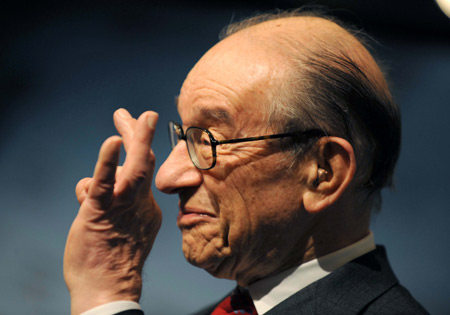| Former Federal Reserve Chairman Alan Greenspan said he is more worried about the increasing U.S. debt than the weakening dollar during a meeting here on Thursday.
Speaking at the Council on Foreign Relations in New York, Greenspan said he is "not overly concerned" about the most recent decline in the dollar, which has hit a 14-month low against the euro and other major currencies.
 |
|
Former Federal Reserve Chairman Alan Greenspan speaks at the Council on Foreign Relations in New York, the U.S., Oct. 15, 2009. Greenspan said on Thursday that he was more worried about the increasing U.S. debt than the weakening dollar, which recently hit a 14-month low (XINHUA)
| "Remember, the dollar surged when the crisis began as we still conceive dollar as safe heaven. We are now back to the levels just prior to the crisis," he said.
Meanwhile, Greenspan expressed grave concern about the long-term costs to the United States from the increasing national debt, which according to him is the "most worrisome aspect of the economic agenda in the United States."
In long term, government budget deficits would likely be even bigger than current record estimates, and the deficits would continue to put downward pressure on the currency and upward pressure on borrowing costs, Greenspan said.
"It will begin to affect the yield on long-term interest rates," he said.
Greenspan said it is difficult to determine whether what happened in the past few years is a once-in-a-century type of event or just a repeat of periodical breakdown in the system.
"Remember that when you are dealing with a market-based system, you have innovations occurring all the time. And indeed few people realized that Edison had more failures than successes," he said. "And the issue of our system, which is centrally created instruction system, has many failures, and one of the purposes of our market system is to clean them out."
Greenspan said the system needs to be repaired, rather than to be replaced. And the critical problem is the "too-big-to-fail" issue. "If they are too big to fail, they're too big," Greenspan told the audience.
"That is to me the major issue. If we do not get it right, we are going to be in terrible shape," he said. "We no longer have the capability of having a credible government response, which says hence forth, no institutions will be supported because it is too big to fail."
Greenspan said too-big-to-fail is a bad policy anywhere, because it is whole contrary to the very structure of what markets work. "Failure is an integral part and necessary part of a market system," he said.
U.S. President Barack Obama unveiled in mid-June this year his plan to reshape financial regulation. Under the new plan, the government will make the Fed a systemic risk regulator to oversee large institutions whose failure could threaten the stability of the entire system.
The Obama administration has urged many times the U.S. Congress to pass the regulatory reform as soon as possible. But up to now, only the part on executive compensation regulation got approved in the House. Congress is expected to decide on the whole series of regulatory reforms next month.
Greenspan served as chairman of the board of governors of the Federal Reserve System for more than 18 years. He also served as chairman of the federal open market committee, the system's principal monetary policymaking body.
(Xinhua News Agency October 16, 2009) | 